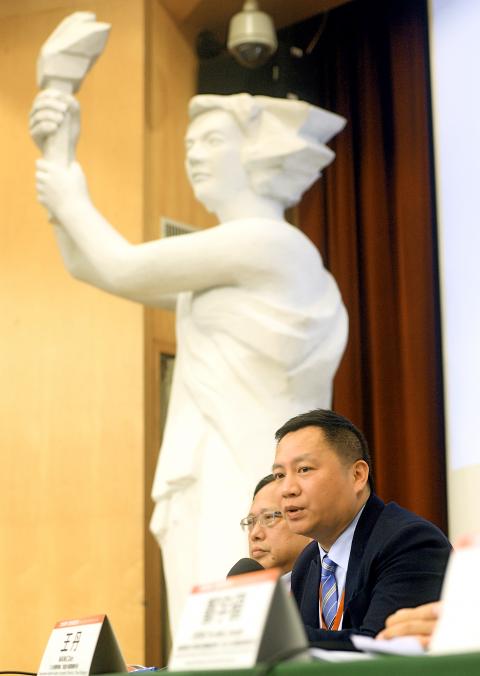Exiled Chinese dissident Wang Dan (王丹) yesterday called on all Chinese longing for democracy to “never forget, never give up, reunite and start over” ahead of the 30th anniversary of the Tiananmen Square Massacre.
Wang made the remarks in Taipei at the opening of a three-day seminar on the massacre organized by the New School for Democracy and the Hong Kong Alliance in Support of Patriotic Democratic Movements of China.
Chinese President Xi Jinping (習近平) in his address on the centennial of the May Fourth Movement, repeated calls he has made on numerous occasions this year that the Chinese government would conduct thought reform on young people starting from kindergarten, which suggests that young Chinese would undergo a change in thinking and to their social atmosphere, said Wang, a leader of the student-led democratic movement that sparked the bloody crackdown in Beijing on June 4, 1989.

Photo: Lin Cheng-kung, Taipei Times
Arrests of left-leaning young people in China are ripples sent by a deep stirring of the ideologies of young Chinese, who are no longer docile like “stagnant water,” he said.
“If young Chinese had remained obedient and not made waves, Xi would not be so edgy,” Wang said, adding that the perceived changing attitudes among young Chinese is worth watching.
Modern-day Chinese culture is Beijing’s greatest weapon against the West, he said, citing the number of rich Chinese who have “spent a lot of money” to send their children to top US universities like Harvard, Stanford and Yale.
Beijing maintains a laissez-faire attitude to this trend and Chinese parents are proud of their actions, but Washington will not stand idly by as the Chinese Communist Party (CCP) regime attempts to root out democracy by infiltrating the culture of other nations, which is the greatest threat to democracy, the world and humankind, he said.
Knowledge of the massacre must be passed on to future generations of Chinese, as it is foreign to younger Chinese and gradually fading out from the memories of Westerners, he said.
With the precarious state of the limited autonomy that the CCP promised Hong Kong before its handover from the UK in 1997 and Beijing seeking to expand its influence in the West, all stakeholders should renew dialogue to define what the massacre has come to embody over the past 30 years and what lessons people should learn from it, Wang said.
Alliance chairman Albert Ho (何俊仁) said that the seminar was held in Taiwan, as many speakers were denied entry into Hong Kong.
If a bill allowing extraditions from the territory to China passes into law, he would not dare invite speakers to Hong Kong, even if the government eases entry restrictions, Ho said.
Hoover Institute senior fellow Larry Diamond said that the CCP has been systemically diluting people’s memories of the massacre and restricting research into it.
Beijing is also using “sharp power” to threaten democratic societies worldwide, Diamond said.

Civil society groups yesterday protested outside the Legislative Yuan, decrying Chinese Nationalist Party (KMT) efforts to pass three major bills that they said would seriously harm Taiwan’s democracy, and called to oust KMT caucus whip Fu Kun-chi (傅?萁). It was the second night of the three-day “Bluebird wintertime action” protests in Taipei, with organizers announcing that 8,000 people attended. Organized by Taiwan Citizen Front, the Economic Democracy Union (EDU) and a coalition of civil groups, about 6,000 people began a demonstration in front of KMT party headquarters in Taipei on Wednesday, organizers said. For the third day, the organizers asked people to assemble

Taipei is participating in Osaka’s Festival of Lights this year, with a 3m-tall bubble tea light installation symbolizing Taiwan’s bubble tea culture. The installation is designed as a bubble tea cup and features illustrations of Taipei’s iconic landmarks, such as Taipei 101, the Red House and North Gate, as well as soup dumplings and the matchmaking deity the Old Man Under the Moon (月下老人), affectionately known as Yue Lao (月老). Taipei and Osaka have collaborated closely on tourism and culture since Taipei first participated in the festival in 2018, the Taipei City Department of Information and Tourism said. In February, Osaka represented

POOR IMPLEMENTATION: Teachers welcomed the suspension, saying that the scheme disrupted school schedules, quality of learning and the milk market A policy to offer free milk to all school-age children nationwide is to be suspended next year due to multiple problems arising from implementation of the policy, the Executive Yuan announced yesterday. The policy was designed to increase the calcium intake of school-age children in Taiwan by drinking milk, as more than 80 percent drink less than 240ml per day. The recommended amount is 480ml. It was also implemented to help Taiwanese dairy farmers counter competition from fresh milk produced in New Zealand, which is to be imported to Taiwan tariff-free next year when the Agreement Between New Zealand and

Taiwanese professional baseball should update sports stadiums and boost engagement to enhance fans’ experience, Chinese Professional Baseball League (CPBL) commissioner Tsai Chi-chang (蔡其昌) told the Liberty Times (sister paper of the Taipei Times) in an interview on Friday. The league has urged Farglory Group and the Taipei City Government to improve the Taipei Dome’s outdated equipment, including relatively rudimentary television and sound systems, and poor technology, he said. The Tokyo Dome has markedly better television and sound systems, despite being 30 years old, because its managers continually upgraded its equipment, Tsai said. In contrast, the Taipei Dome lacked even a room for referees